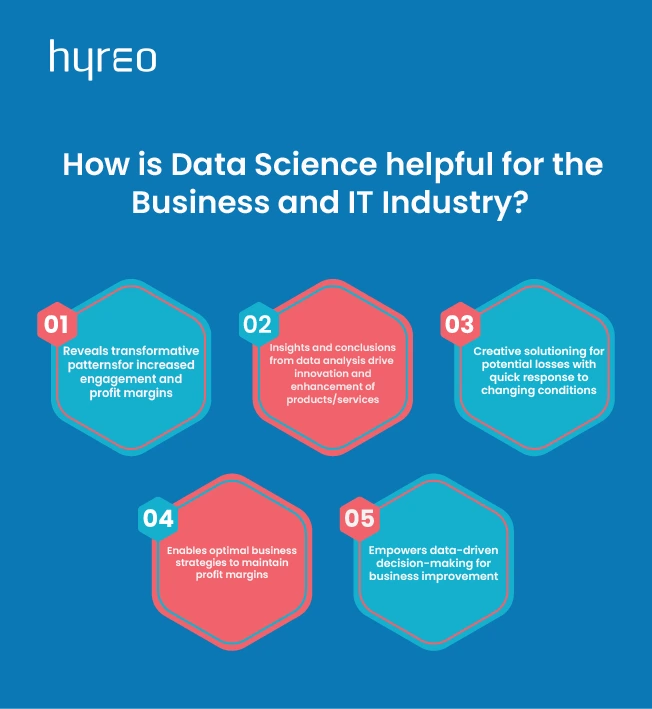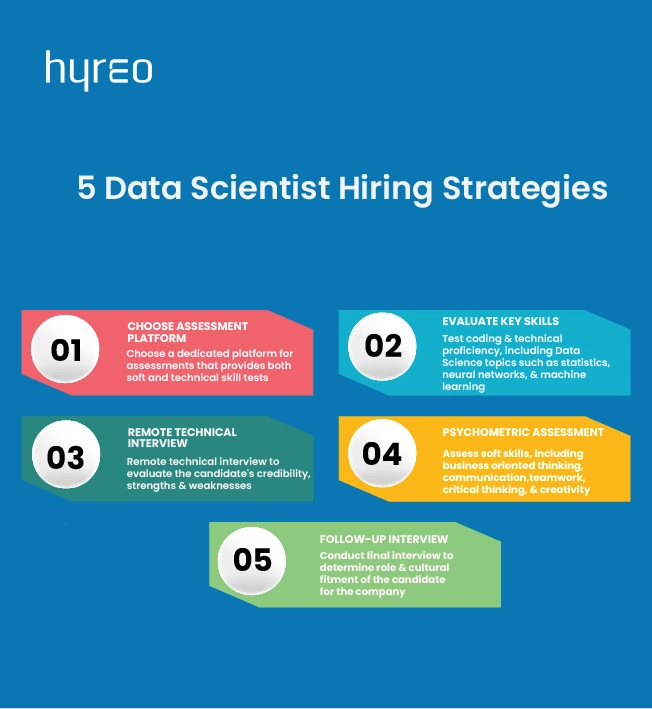In this high-tech and modernized world, an essential asset is data. It is a simple four-letter word, but the power it holds is enormous. At a time when smartphones and technology are essential to every human being, 1.7 megabytes of data is generated every second! At this rate, IDC researchers estimate that the global data will grow to a whopping 175 zettabytes!
The essential thing to understand is that big data is useless until it is sorted and fundamental information is mined out from the massive volumes of data. It is necessary to discover a way to interpret, structure, and present the data in a meaningful and fruitful way.
This is where the skillset and power of data scientists come in to help businesses and start-ups. A data scientist harnesses big data to find and analyze trends, apply analytics, and discover features and insights to enhance business strategies.
As per experts in the US Bureau of Labor Statistics, the demand for data scientists is expected to rise by 15% by 2029, and the jobs related to data science are supposed to increase by 26% by 2026.
However, what does a data scientist do that makes them highly regarded by the blooming and giant companies?
How has Data Science evolved?

Forbes’ article titled “A Very Short History Of Data Science”, along with other resources cites that a mathematician named John Tukey was the first to suggest the upcoming field of data science, which focused on gathering insights or learning from data. He wrote and explained the convergence of statistics and computers to calculate measurable outputs within hours.
In 1974, Peter Naur, a Danish computer science pioneer, used the term “Data Science” frequently throughout his book called “Concise Survey of Computer Methods.”
When the entire world got universal access to the Internet, and smooth connectivity, along with it came, it opened the gateway to storing data collection. In 2005, traditional technologies could not store and manage massive data collected by Facebook and Google, and the need for new and efficient technology rose. Hadoop, Cassandra, and Spark made their debut and saved the world by handling Big Data.
By 2013, when IBM revealed that 90% of the global data had been created in the past few years, it was this time the world understood the importance of data science and its power to change business strategies. In 2015, Machine learning, deep learning, and artificial intelligence entered the realm of data science to make our lives easier by bringing AI into our lives.
In the 2020s, there are breakthrough technological innovations with the help of data science and artificial intelligence. Cloud computing transformed the way an organization approaches information technology. Cloud-based technologies opened the way for the Internet of Things and data science to monitor and collect data in real-time.
Data scientists are trying to find ways to develop intelligent and autonomous AI through machine learning. They are using deep learning to make smart computers, which will help create powerful and advanced robots with intelligent AI. If you imagined a world of robots and humans interacting with each other seamlessly, hold on to that thought because it might soon become a reality. It will help automate labor, and the health, transportation, finance, and defense industry will witness a revolution.
Prominent use cases for Data Science in 2023
Data Science can be defined as the process of building, cleaning, and structuring datasets for analyzing and finding a pattern or information from the data stack. The information can be used to understand the gigantic data efficiently and derive conclusions that can be helpful in making wiser decisions.
Where is data science widely used?
Almost every industry needs data scientists to help them understand what the numbers are trying to convey. To name a few, here are the top ten industries that need data scientists:
- Marketing
- Healthcare
- Finance, banking, and insurance sector
- Retail
- Telecommunication
- Automotive
- Digital Marketing
- Media and entertainment
- Cyber security
- Mining and oil extraction
What is Data Science used for?
Have you wondered how data science works? Here are four prominent ways data scientists use to study and analyze the data:
Descriptive Analysis
By examining the data, descriptive analysis helps to find what happened in the past or what is happening currently. The best example where descriptive analysis can be used is to record the number of tickets booked using a flight booking service.
Diagnostic Analysis
Diagnostic Analysis is the detailed examination to understand the reasons that led to the present situation. Diagnostic Analysis is used by the same booking service to find out what caused a booking spike in the previous month.
Predictive Analysis
Predictive analysis uses data to make precise and accurate forecasts of what may happen in the future. For example, the flight booking service may use predictive analysis to understand and predict ticket sales for the next year.
Prescriptive Analysis
Prescriptive analysis is the next and upgraded version of predictive analysis. It helps to predict all the possible outcomes of the decision. Apart from predicting the future, it also suggests the best course of action to deal with the outcome.
How is Data Science helpful for the Business and IT Industry?
Here is how data science helps numerous start-ups, businesses, and IT industries to grow and expand impeccably:
- Data Science helps to unravel unknown and hidden transformative patterns that have the potential to increase user engagement and profit margins.
- The insights and conclusions drawn by examining the data can help businesses to innovate and enhance their services and products.
- Data Science helps to find an effective solution for problems commonly faced by companies that can bear heavy losses. It helps large-scale companies to respond promptly to changing conditions and optimize their business strategies to maintain the profit margin.
- It also helps organizations and businesses make essential decisions for the betterment of the business, backed by numbers and figures.
4 Key skills in Data Science
Data science is a combination of computer science, data technology, visualization, mathematics, and statistics. However, only a technical skill set cannot define whether a particular candidate can contribute to the success of the company business. Non-technical skills play a significant role, just like technical skills.
Data scientists having a Master’s or Ph.D. in statistics, mathematics, or computer engineering are best suited for this job. Here are technical skills that a data scientist should have expertise at:
1. Programming
Having knowledge and expertise in various programming languages like Python, Perl, SQL, C/C++, and Java is essential as data scientists write algorithms and programs to analyze big data.
2. Flexible using Analytical tools
Analytical tools like Hadoop, Spark, Pig, and R help in extracting valuable information from organized data.
3. Adept at working with unstructured data
Most times, data scientists should have experience working with unstructured data coming from other resources. Computers cannot deal with unstructured data as it does fit in any predefined model that a computer can work on.
4. Other technical skills
It is best if the data scientists know about machine learning, artificial intelligence, deep learning, data visualization, data wrangling, statistics, and probability.
Here are some non-technical skills you should look for in a data scientist:
- Communication skills
- Curiosity
- Team player
- Critical thinking
- Adaptability
- Product understanding
- Organizational skills and awareness
5 Data Scientist Hiring Strategies
Data science is a competitive field today; the success rate of hiring a strong and capable candidate is less than 50% because the candidate might have more than three offers from different organizations. It is essential to make good use of the opportunity and find the right candidate because the entire hiring process takes up 20% of data scientists’ team time.
Hiring the right candidate can be a tiring process. However, Hyreo is here to make the hiring process simplified and easy. Here are some techniques that you can implement to revolutionize the hiring process and get effective results:
- Investing in an always-on recruitment process is the best way to find the right candidate.
- Interviewer biases can ruin your strategy to find an A+ candidate.
- Instead of asking simple technical questions, give the candidate a problem they will face in the future.
- It is best to involve key partners to find the right candidate for the team and company.
- In this competitive world, when every organization wants the brightest and the best, it is necessary to keep the momentum high and hire the best quickly.
How to find the right data scientists for your team?

Here are five steps that should be in a data science job assessment that will help the hiring managers to evaluate the candidates:
1. Choose the right platform for the assessment.
Choosing a dedicated platform with tests available to evaluate your candidates is essential and will help you with results effortlessly. You can look for a platform that provides a test to evaluate the candidate’s soft and technical skills. Moreover, some platforms give you the freedom to create your test.
2. Start with coding and technical skills.
Data science is all about data and writing code to manipulate and find effective results from the data. So, you can create a test that evaluates the candidate’s coding skills. Moreover, besides being proficient with programming languages, the candidate should be thorough with data science topics like statistics, neural networks, machine learning, big data, and data mining. The ideal candidate should be familiar with visualizing, presenting, and efficiently analyzing data.
3. Set up a take-home technical interview.
You can set up a take-home technical interview for the candidates who cleared up the coding and technical assessment. It will help you get more information about the candidate’s credibility and talent. You can evaluate and validate the assessment results by giving a coding or any problem for solving. Moreover, an interview lets you know whether the candidate fits perfectly in the company’s environment.
4. Remember to take a soft skill assessment.
Soft skills are essential to look for in a candidate because technical skills only matter if the candidate can work with the team. It is impossible to reap the benefits of a candidate if they are hard to work with. Here are some soft skills that you should test your candidate for: business-oriented, communication skills, teamwork, critical thinking skills, and creativity.
5. Conduct a follow-up interview.
A follow interview is always best to evaluate whether the candidate is a perfect fit for your company. It is an honest conversation between you and the candidate where you can question the strength and weaknesses of the candidate displayed on the previous assessments.
Wrapping it up
As long as data is there, scientists need to deal with and mine out essential information like diamonds. Data Science is one of the top choices of today’s youth to develop their career in the ever-growing and evolving field.
The role of data scientists is to predict uncertainty with great precision and bring fruitful results to the company. Altogether, hiring a candidate who is well-versed in technical skills but has a confident and bright personality is essential. After all, predicting the future is a risk, and one needs to be confident with the result.
Hyreo will help you to enhance the candidate recruitment process and deliver a customer-like experience for candidates throughout the recruitment process. Book a demo service today and make your recruitment process advanced and simplified!
FAQs on Data Scientist Recruitment
What are the key skills to look for in data scientists?
As the popularity and demand of data science increases, here are some technical skills that one should look for while hiring data scientists:
Programming languages and analytical tools like Python, Java, Sharp, and Hadoop.
Machine learning and deep learning
Statistics and probability
Problem-solving and organizational skills
What are the different assessment techniques for hiring data scientists?
Here are some assessments that will help to hire data scientists:
Coding assessment
Data Science assessment
Take-home assessment
AI-powered proctoring
One-on-one coding
Interview
What are the top 5 interview questions for data scientists?
Here are some questions that you can ask in an interview that will test their capability and skills:
How to differentiate between supervised and unsupervised learning? How is a true positive rate different from a false positive rate?
What is a confusion matrix? Explain a way to calculate the accuracy of a confusion matrix.
What algorithm is used by Amazon to suggest recommendations to the users on their website?
You have a data set consisting of variables with more than 30% missing values. How will you deal with them?
Which algorithm best predicts the probability of death from a heart disease based on three risk factors: cholesterol levels, gender, and age? Choose from the following options: Logistic Regression, Linear Regression, K-means clustering, or Apriori Algorithm.



